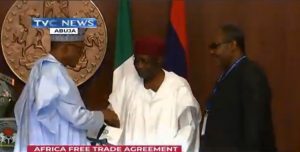
Nigeria has been advised to consider joining the Africa Free Trade Agreement because of the immense opportunities it provides for Nigeria’s manufacturing and service companies to expand to Africa.
This was part of recommendations of the report of the Committee set up to assess the impact of the Africa Continental Free Trade Agreement which was submitted to President Muhammadu Buhari.
The African Union Heads of States adopted Phase I of the Agreement on the African Continental Free Trade Area (AfCFTA) at its 10th Extraordinary Summit in Kigali, Rwanda, on 21st of March 2018.
The agreement was brokered by the African Union (AU) and was signed on by 44 of its 55 member states at that meeting, and since then 52 of the 55 African countries have signed the agreement.
The agreement initially requires members to remove tariffs from 90% of goods, allowing free access to commodities, goods, and services across the continent.
Member countries are further required to ratify the agreement they have signed for it to come into force.
On the 2nd of April, 2019, The Gambia became the 22nd state to ratify the agreement
But Nigeria is one of the African countries yet to sign on to the Agreement.
Instead, it set up a committee to broadly consult and consider both the positive and negative implications of both signing and ratifying the agreement before coming to a decision.
The Committee submitted its report and again, the President feels the need to explain why his government is hesitant about signing the AFCTA agreement
Intra-African trade forms only 14% of Africa’s total trade, with consumption made up mostly of goods imported from outside the continent.
The Committee envisages that the trade liberalization offered by the AfCFTA will make African goods more attractive and potentially cheaper than similar products from outside the continent.
But it acknowledges that AFCTA is not without major risks, the most significant being the potential rise in smuggling and abuse of rules of origin.
The President promises to look into the report, which he says will form part of the considerations in the next steps taken on the AfCFTA in particular and on broader trade integration subjects.




